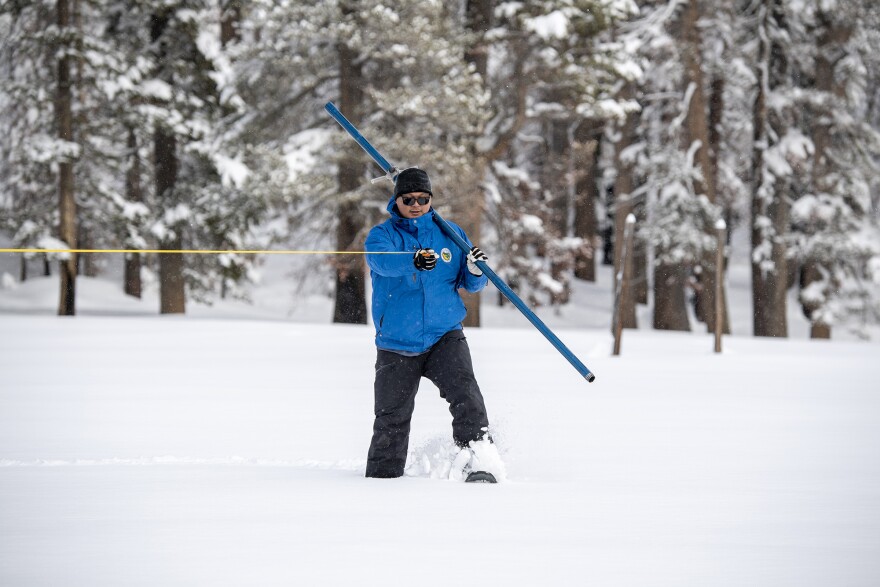This story is free to read because readers choose to support LAist. If you find value in independent local reporting, make a donation to power our newsroom today.
California’s Snowpack Is Melting Faster. Why That Affects The State’s Water Supply

California's snowpack provides a third of the state's water supply, and that’s great news considering we had record snowfall this year. But the snowpack is melting faster and earlier, according to a recent study in the Geophysical Research Letters journal.
The problem
Benjamin Hatchett, an atmospheric sciences professor at the Desert Research Institute, says snow is supposed to accumulate through the winter and melt in the spring and through the summer to supply our water through the dry period of the year.
That matters, he explains, because "our system is not set up to handle that melt and hang onto it. And so we don't have as much water available when we need it most late in the summer and into the fall."
Don't panic just yet!
Andrew Schwartz, of the Central Sierra Snow Laboratory, says most of the snowmelt that’s happened so far has been in burned areas.
"Fortunately, so far, most of our snow melt has yet to occur — with temperatures that are roughly below average for this entire winter, which has been really favorable for holding off some of that early snow melt," Schwartz says.
Why it matters
A few things to keep in mind about environmental factors that work together to create the current problem:
- Trees destroyed by wildfire can no longer provide shade for snow.
- Burned material left behind by fires turns the snowpack dark and absorbs more sunlight.
- Those two factors drive the snow to melt much faster and earlier.
The backstory
While a lot of snowmelt makes it into reservoirs across the state, they're managed for flood control and water resources in the winter.
That means even in drought years, reservoirs need to maintain space in case the state has a series of atmospheric rivers like the ones that pounded the state late last year, or unexpected snow. More recently, California has been experimenting with a different approach in an effort to capture more stormwater. That approach relies on weather forecasts and real-time decisions instead of scheduled water releases, but it's still being tested.
There's reason to be concerned about intense rainfall: In 2017, nearly 200,000 people living downstream were evacuated after heavy rains damaged the Oroville Dam and almost flooded surrounding communities.
Current reservoir levels
So...what about the drought?
California is experiencing one of the best snowpacks in 40 years. Schwartz says we're at 138% above the April 1 average — that's when the final snowpack measure of the season is done.
"With the amount of snowpack that we have, as wonderful as it is, it looks like it's going to be making impacts on short-term drought," Schwartz says. "If we can get additional precipitation, more snowfall through Central and Northern California, and even Southern California, that'll help us start to look at potentially coming out of that long-term drought as well."
Listen to a conversation
We talked with Hatchett and Schwartz on our newsroom's talk show AirTalk, which airs on 89.3 FM study’s findings and the effect wildfires have on California's snowpack.
-
Eagles Jackie and Shadow may have another full nest on their feathers this season.
-
The Governor’s proposal uses cannabis tax revenues to support child care infrastructure affected by the January 2025 fires.
-
The strikes will take place at Kaiser facilities in California and Hawaii.
-
Los Angeles joins Minneapolis for a walkout at some schools and workplaces to protest immigration enforcement operations.
-
A federal judge has blocked the federal government’s effort to get California voters’ data, but the battle is not over.
-
An L.A. County Superior Court judge says proper processes and regulations regarding hazardous waste, which isn't allowed at the Calabasas landfill, were followed.












